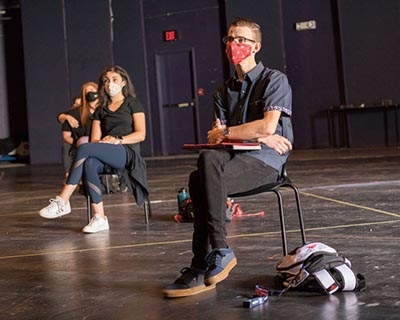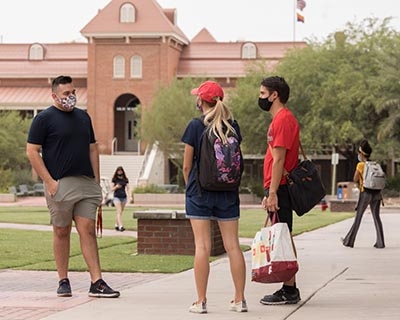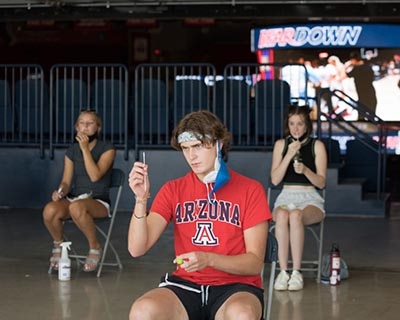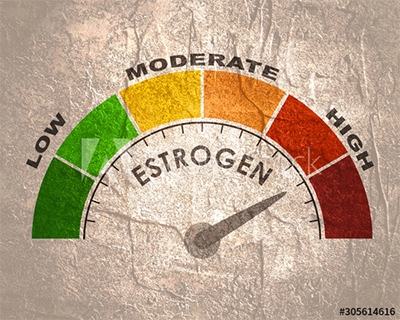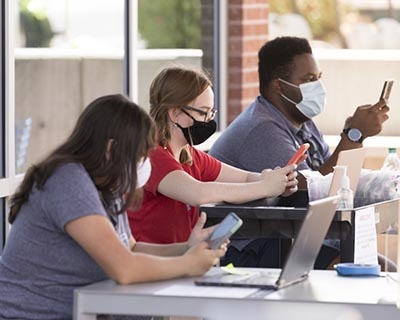News
The Arizona portion of an 11-state effort, funded by a $12 million federal award, to address the uneven impact of the pandemic on racial and ethnic minority communities will be led by the UArizona Health Sciences.
On Oct. 12, the university hopes to resume in-person instruction for classes of 30 or fewer students that were designated in-person or flex in-person courses at the time of registration.
A new study finds menopause-induced changes to protective immune cells may add to a spike in high blood pressure in postmenopausal women – findings with implications for sex differences in COVID-19 responses.
The number of positive test results on campus decreased following a 14-day shelter-in-place recommendation.
University of Arizona Health Sciences passes $200 million milestone in research funding in fiscal year 2020, addressing some of the world’s most challenging health conditions, including COVID-19.
While the campus has seen a spike in cases over the last few weeks, Friday’s positivity rate was down from last week, and no new students were admitted to isolation housing over the weekend.
UArizona President Dr. Robert C. Robbins said the university expected to see an increase in COVID-19 cases, but it has become too much, necessitating a shelter-in-place recommendation similar to what the state faced in the spring.
Dr. Theresa Dr. Cullen, director of the Pima County Health Department, said the county, university and other partners are working together on a “layered approach” to COVID-19 mitigation.
The university will conduct 5,000 COVID-19 tests per week as part of continued efforts to slow the spread of the virus.
Dr. James Galligan and his University of Arizona College of Pharmacy research team found inhibiting glyoxalase-II enzyme results in slower cell growth, which may help limit disease progression.
Arizona Center for Drug Discovery and University of Arizona Cancer Center host Sept. 15 virtual summit to discuss new innovations in drug discovery to benefit citizens throughout the state and more.
The antibody test determines who has been exposed to and developed an immune response against COVID-19.
Inappropriate medications – such as oleandrin, a derivative of oleander known to be toxic – used to prevent or treat COVID-19 could cause significant harm and no benefit, University of Arizona Health Sciences-based center and Banner Health center warn.
A University of Arizona Health Sciences cohort study of more than 50,000 menopausal women showed significant decrease in Alzheimer’s disease diagnosis.
UArizona and Covid Watch Launch COVID-19 Exposure Notification App
University of Arizona pharmacologist Dr. Todd Vanderah discusses how the conditions created by the COVID-19 pandemic and the response could be exacerbating drug use and overdose.
New findings by University of Arizona College of Medicine – Tucson chemists Drs. Wolfgang Peti and Rebecca Page provide a foundation to better understand and treat these neurological disorders.
The university will offer four class formats and implement a range of safety measures on campus when the fall semester begins on Aug. 24 as scheduled with a mix of in-person and remote instruction.
A $3.8-million federal grant will allow a team led by the University of Arizona College of Pharmacy to continue to develop a drug to prevent or reverse this devastating neurodegenerative disorder.
Recent notices include appointments for curricular affairs, licensing, sleep medicine, research and student mental health, plus national awards for mentorship, diversity and pancreatic cancer studies.
A free statewide COVID-19 antibody testing program expands to 15 categories of essential workers at high risk of exposure, in concert with a $7.7 million UArizona study to better understand immunity.
In addition, Dr. Sweasy will serve as UArizona chief adviser on cancer-related matters and principal investigator of the National Cancer Institute Cancer Center Support Grant.
Known as a champion of students, Dr. John Streicher fosters success through his roles as an assistant professor, researcher and graduate program director.
COVID Watch sends exposure alerts without having to collect any personally identifying information from users, protecting their anonymity.
University of Arizona president, Dr. Robert Robbins announced in April his plans to resume in-person classes Aug. 24, bringing back 45,000 students and 15,000 faculty and staff for fall 2020.



